
Kent County is a county located in the U.S. state of Maryland. As of the 2020 census, its population was 19,198, making it the least populous county in Maryland. Its county seat is Chestertown. The county was named for the county of Kent in England. The county is part of the Mid-Eastern Shore region of the state, and the oldest county in Maryland.

Chestertown is a town in Kent County, Maryland, United States. The population was 5,532 as of the 2020 census. It is the county seat of Kent County, the oldest county in Maryland.

Chestertown Historic District is a historic district in Chestertown, Maryland. It was listed on the National Register of Historic Places and designated a National Historic Landmark in 1970, and its area was increased in 1984. The town on the Chester River, became the chief port for tobacco and wheat on the Eastern Shore of Maryland between 1750 and 1790. The port declined thereafter, as Baltimore became the major port for such activity. In consequence, Chestertown acquired a collection of more than fifty Georgian style town houses. The 18th-century residential area survived without harm a 1910 fire that destroyed the central business district of Chestertown.
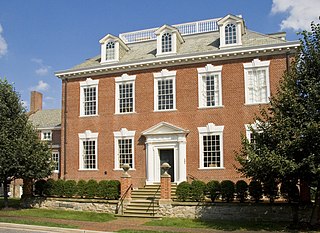
Widehall is a historic and architecturally significant house in Chestertown, Kent County, Maryland. Built by Thomas Smyth III, 1769–1770, it is a contributing property in the Chestertown Historic District.

The Denton House, also known as the Denton-Weeks House, the River House, and the Smyth-Letherbury House, is a historic residence at 107 Water Street in Chestertown, Maryland. It is a three-story brick building, with a five-bay front facade framed by corner pilasters with stone capitals. The building has a raised basement, with a stone stringcourse between it and the first floor. The front entrance is centered, with an elaborate surround consisting of pilasters, entablature and dentillated gable. The house was built about 1784 by Richard Smyth, the son of one of the area's wealthiest merchants. In 1791 it was bought by Peregrine Letherbury, the first law professor at Washington College.
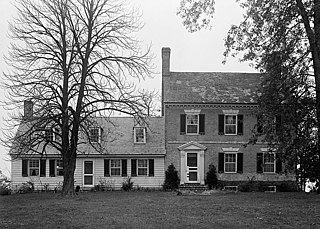
Airy Hill is a historic home located at Chestertown, Kent County, Maryland, United States. It is a two-section dwelling consisting of a 1+1⁄2-story frame wing and a two-story Federal-style brick house. The brick section was added in the early 1790s, together with a middle section that now connects the two. Also on the property is a brick smokehouse and an early-19th-century cemetery.

Brampton is a historic home located at Chestertown, Kent County, Maryland. It is a transitional Greek Revival / Italianate-influenced dwelling built about 1860. The main section of the house is a three-story structure, constructed of brick with a symmetrical five-bay-wide facade and a depth of two bays. A two-story frame wing extends from the rear.

Carvill Hall, also known as Carvill's Prevention, Salter's Load. or Packerton, is a historic home located at Chestertown, Kent County, Maryland. It is a 2+1⁄2-story Flemish bond brick house, with exterior corbeled brick chimneys at each gable end. The main block was built between 1694 and 1709. Additions to the main block date to the 19th century.

Godlington Manor is a historic home located at Chestertown, Kent County, Maryland, United States. It is a frame gambrel-roof structure with a long frame 1+1⁄2-story kitchen wing. The house features much of the original beaded clapboard. Also on the property is a frame milkhouse, a brick smokehouse, and a boxwood garden.

Reward-Tilden's Farm, or The Reward, is a historic home located at Chestertown, Kent County, Maryland. It is a three bay long, two bay deep, two story, brick dwelling which appears to have been constructed in the 1740s.

The Sergeant First Class John H. Newnam Armory, also known as the Chestertown Armory, is a former National Guard armory built in 1931 and located in Chestertown, Kent County, Maryland, United States. From 1932 until 2005 it housed various formations from the Maryland Army National Guard. It also was the home of sporting and community events.
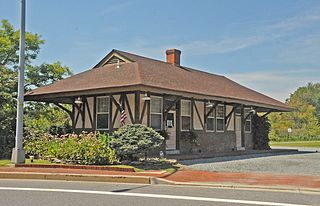
Chestertown is a historic railway station built in 1902–03 for the Pennsylvania Railroad and located in Chestertown, Kent County, Maryland. It is a 1+1⁄2-story, 17-by-47-foot Queen Anne–style building. It features a hip roof with a wide bracketed overhang that provided shelter for train passengers on all four sides.
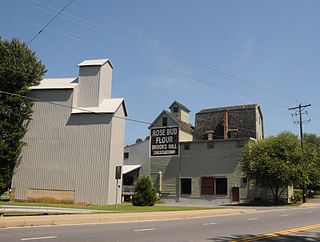
The Radcliffe Mill is a historic grist mill and related structures located in Chestertown, Kent County, Maryland, United States. It consists of a Mill Building, built in 1891; Grain Elevator, probably constructed around 1924; and Annex / Seed House. The complex is historically significant for its association with the development of agriculture and the associated grist milling industry in Kent County. The present complex occupies land along Radcliffe Creek that has been associated with milling for about 300 years. A mill operated in this approximate location from 1694 until 1997.

St. Paul's Church is an historic Episcopal church located near the village of Fairlee, southwest of Chestertown, Kent County, Maryland. St. Paul's Church is one of the original thirty parishes created in 1692 by an Act of the General Assembly declaring the Church of England as the established religion of the Province of Maryland. The Georgian-styled building, completed in 1713, is the second-oldest Episcopal church on the Eastern Shore of Maryland.
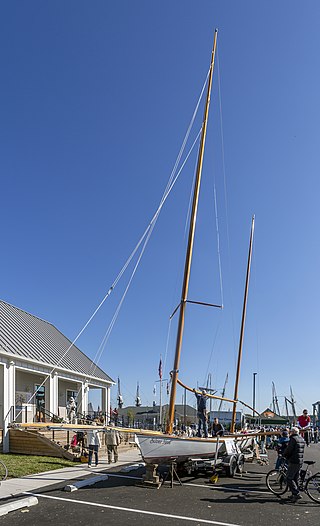
The Silver Heel is a Chesapeake Bay log canoe, built in 1902, in Kent County, Maryland by Eugene Thompson for John Wesley Dickinson. She is a 33'-113⁄4" sailing log canoe in the racing fleet. She has a beam of 7'-3/4". She has a clipper bow, with the longhead braced to serve as a bowsprit, and a straight, raking stern. The canoe is privately owned and races under No. 2. She one of the last 22 surviving traditional Chesapeake Bay racing log canoes that carry on a tradition of racing on the Eastern Shore of Maryland that has existed since the 1840s. She is located at Chestertown, Kent County, Maryland.

The Elsworth is a Chesapeake Bay skipjack, built in 1901 at Hudson, Maryland. She is a 39.9-foot-long (12.2 m) two-sail bateau, or "V"-bottomed deadrise type of centerboard sloop. She has a beam of 14.3', a depth of 3.1', and a gross registered tonnage of 8 tons. She is one of the 35 surviving traditional Chesapeake Bay skipjacks and a member of the last commercial sailing fleet in the United States.
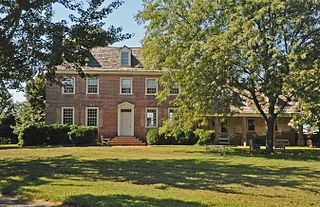
Thornton is a historic family farm located at Chestertown, Kent County, Maryland, United States. The farm is located on a 352-acre (142 ha) plot on Morgan's Creek, a tributary of the Chester River. The main house is a 2+1⁄2-story, five-bay brick house, constructed about 1788, and principally Georgian in style. A 1+1⁄2-story kitchen wing is attached to the west gable end. Also on the property are an early-20th-century dairy barn, a late-19th-century animal barn, a second-half-19th-century granary, a smokehouse, and two sheds. The farm has been owned and operated by the same family for nearly 300 years.
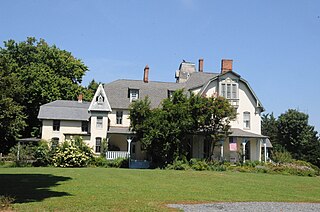
Lauretum is a historic home located at Chestertown, Kent County, Maryland, United States. It is a large, three story late Victorian stuccoed frame house built in 1881 for Chestertown lawyer Harrison W. Vickers (1845-1911). Restored by Jennifer Corcoran and Family. It features irregular massing, multiple roof forms, clipped gables, an oriel window, and exposed rafter ends. It was designed by Baltimore architect Edmund G. Lind (1829-1909).
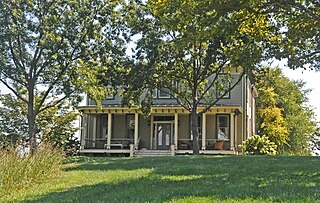
Gobbler Hill is a historic home located at Chestertown in Kent County, Maryland, United States. It was built in 1858 and is a center-hall plan frame house on a foundation of local fieldstone and brick. It is five bays wide, two bays deep, and two stories tall with late Greek Revival / early Italianate style details. It features a shallow hip roof surmounted by a tall belvedere and a full-width porch.

Charles Sumner Post #25, Grand Army of the Republic is a historic fraternal lodge building located in Chestertown, Kent County, Maryland. Named after Charles Sumner, it was constructed as a meeting hall about 1908 and is a two-story gable-front frame building, built on brick piers, with a rectangular floor plan. It is located in the Scotts Point area, a historically black area within the Chestertown Historic District, and was abandoned between 1985 and 2002. It is one of only two Grand Army of the Republic halls for African-American veterans known to survive in the Nation.
























